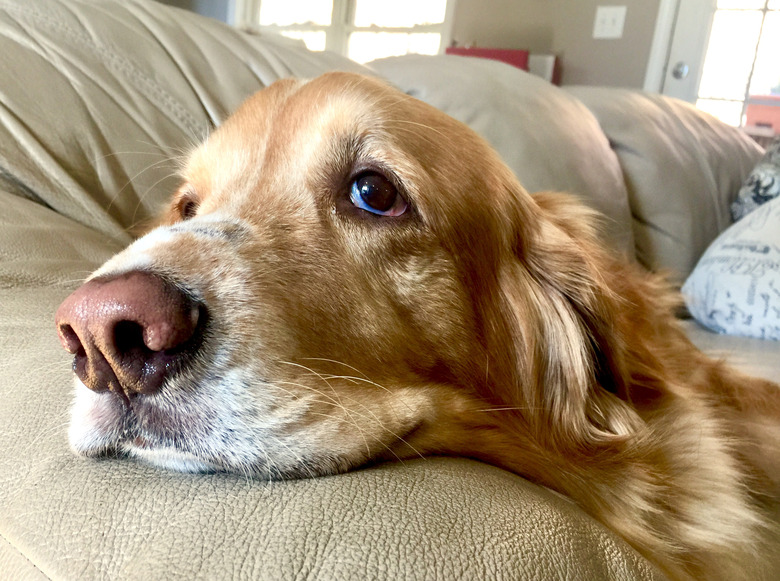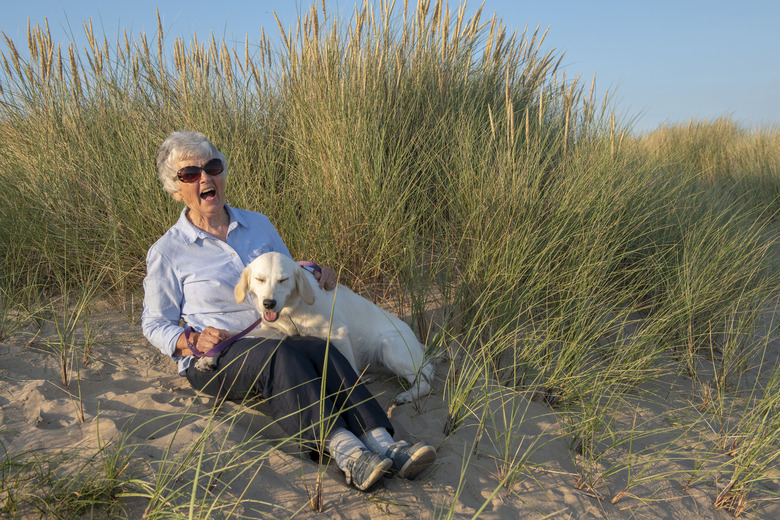Signs Of A Dog Dying From Heart Failure: What To Expect, Symptoms & Care
No one wants to hear the veterinarian utter the words "congestive heart failure," but getting a diagnosis from a veterinary cardiologist who has taken X-rays and performed an echocardiogram can work to your dog's advantage. Once you know your beloved companion is suffering from CHF, you and your veterinarian can take steps to give them a good quality of life.
With treatment, some dogs live for a year or more after a CHF diagnosis. You can further help by learning the common symptoms of congestive heart failure from the early stages to end stage. Understanding underlying causes and how heart disease progresses allows you to prepare yourself to support your dog through every stage of their journey.
Your dog will retain fluid
Your dog will retain fluid
Malfunctioning heart valves (especially the mitral valve) cause approximately 80 percent of congestive heart failure cases. Older chihuahuas are more prone to developing this. As the condition progresses, the heart muscle weakens and starts to pump less effectively, causing fluid accumulation in your dog's body.
Another cause of congestive heart failure in dogs is dilated cardiomyopathy (DCM,) which causes an enlarged heart and often affects a dog's heart rhythm. The left ventricle is particularly affected by this disease. Certain breeds like boxers, cocker spaniels, English springer spaniels, and dobermans are more likely to develop DCM.
If a dog has left-side congestive heart failure, fluid called pulmonary edema will settle into their lungs. You may notice that they have trouble breathing and are panting or struggling for air even when resting. They will also develop a loud but unproductive cough as their body tries to push the edema out of the lungs. While a dog may develop failure of both sides of the heart, it is more common that they have left-side congestive heart failure.
During early stages of CHF, your cardiologist will likely reduce the salt in your dog's diet and prescribe several medications and supplements to help increase the strength of the heart muscle's contraction as well as a diuretic to help your pooch push out excess water. Your veterinarian may also recommend periodic oxygen treatments to help with the difficulty breathing.
When a dog has right-side congestive heart failure, fluid will generally collect in the abdomen, causing it to swell. This is called ascites. Over time, fluid may also start to collect and cause swelling in the legs too.
In cases with right-side failure, an abdominocentesis may be recommended. During this procedure, your veterinarian will use a needle to extract some of the fluid buildup in your dog's abdomen to make them more comfortable. Likewise, in cases with left-side failure, your veterinarian may recommend a thoracocentesis to extract some of the fluid accumulation in your dog's chest.
Expect your dog to have appetite changes
Expect your dog to have appetite changes
As right-side heart disease progresses, fluid accumulates in a dog's abdomen, pushing on their stomach and making them feel full. Some of the drugs used to treat CHF can have side effects. Pimobendan, a vasodilator, can cause loss of appetite and diarrhea. Furosemide, a diuretic, can cause increased thirst or urination. ACE inhibitors can cause vomiting, diarrhea, weakness, and collapse.
To keep their health and strength at their best, your veterinarian may recommend an appetite stimulant. You may also succeed at coaxing your dog to eat if you mix in some of their favorite treats with their kibble. Be careful with this approach, though. Some of your dog's favorite snacks might irritate their stomach and make them even more stubborn about eating, or they could be high in salt, which would adversely affect dogs who are already retaining water.
Talk to your veterinarian before taking this approach to be sure you make good treat choices. Even if you can keep your dog eating, they may eventually stop. Unfortunately, a complete refusal to eat, along with weight loss, are common symptoms that a dog's heart function is decreasing and the dog is dying from congestive heart failure.
Your dog will show increased lethargy
Your dog will show increased lethargy
The lack of adequate blood flow caused by CHF makes exercising difficult. As the CHF progresses, you may notice your dog is unable to take long walks or play fetch with the same unending exuberance they once had. Eventually, your dog may lose interest in these activities altogether as they become increasingly difficult for them, especially with the difficulty breathing and changes in respiratory rate and heart function.
As they reach the end stages of CHF, your dog will go from having little interest in exercise to none at all and may refuse to move any more than is absolutely necessary. You'll notice them sleeping more too. Even if they are a young dog, they will act like an older dog.
Congestive heart failure late stages
Congestive heart failure late stages
Even though you've done a good job helping your dog navigate their CHF, the very late stages will eventually come. At this point, your dog will frequently cough and have difficulty breathing even when resting. Their gums may turn a bluish-gray color, and they may faint upon standing or walking. You're likely to notice that they have trouble doing anything at all, including sleeping. This is particularly true of dogs who sleep on their sides.
You may also notice your dog seems unable to lay down, instead sitting upright to make breathing easier. At this stage, easing and managing the common symptoms of CHF simply aren't possible. You can still help your faithful pooch, however, by kindly choosing to end their suffering before the CHF results in sudden death. Though hard to do, euthanasia is sometimes the best gift you can give.
The bottom line
The bottom line
There are two types of congestive heart failure: left side and right side. While left side is more common, it is possible to have both conditions. The nature of congestive heart failure is to cause fluid buildup in the body's cavities, typically the dog's lungs or abdomen, as heart function decreases. There are medications and supplements, like diuretics or ACE inhibitors, that your cardiologist can prescribe to help slow the progression of the disease, but eventually, the heart muscle will weaken, and the fluid accumulation will interfere with their ability to do even the simplest of activities. The kindest gift you can give your dog when they reach this stage is euthanasia.


